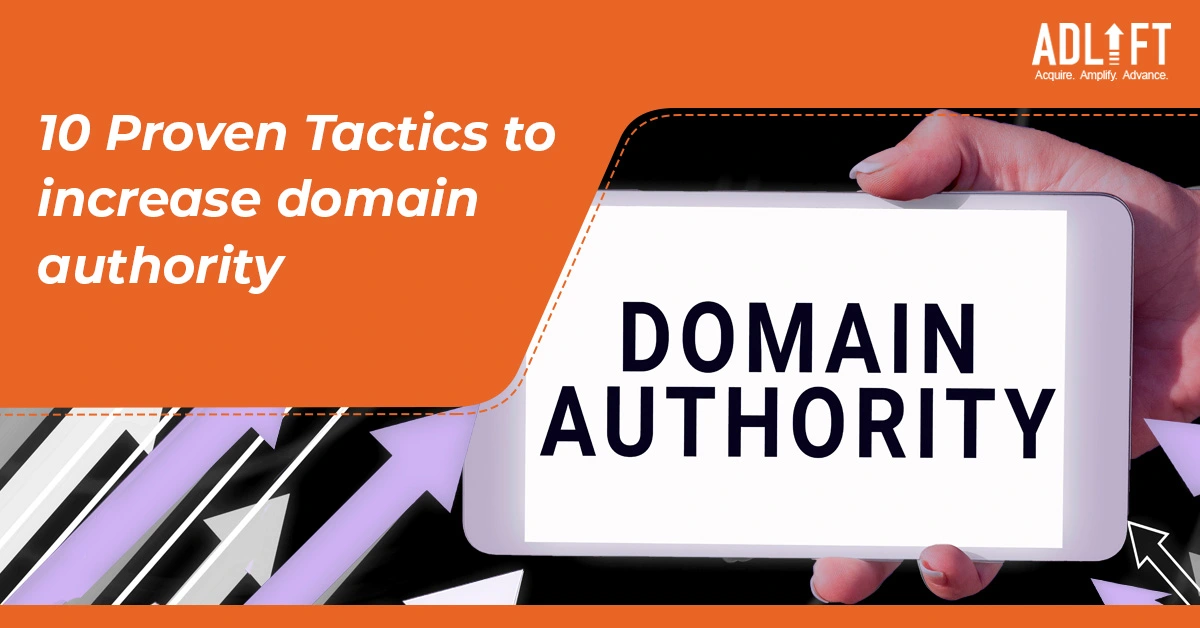10 Proven Tactics on How to Increase Domain Authority

As a website owner, increasing domain authority is crucial for gaining better search engine rankings, driving more traffic, and building a strong online presence. In this article, we’ll share 10 proven tactics on how to increase domain authority that you can implement on your website today.
What is Domain Authority?
Domain Authority (DA) is a search engine ranking score developed by Moz that predicts how well a website will rank on search engine result pages (SERPs). It is measured on a scale from 0 to 100, with a higher score indicating a greater ability to rank. DA takes into account various factors, such as the number and quality of backlinks, website content, and user engagement.
How to Check Your Website’s Domain Authority
Before we tell you ‘How to increase domain authority’, you will need to check your website’s domain authority as it is at the moment. To do that, you can use various free tools available online. Simply enter your website’s URL, and you will get a score between 0 and 100, along with other useful metrics such as the number of linking root domains and total links.
10 Proven Tactics on How to Increase Domain Authority
-
Build High-Quality Backlinks
One of the most important factors in increasing domain authority is building high-quality backlinks. A backlink is a link from another website to yours, and search engines consider them as a vote of confidence in your website. Focus on getting backlinks from reputable and relevant websites in your industry.
-
Create High-Quality Content
Creating high-quality and valuable content is not only essential for user engagement but also for building domain authority. When you consistently publish relevant and informative content on your website, other websites are more likely to link to it, which can boost your domain authority.
-
Improve On-Page SEO
On-page SEO refers to the optimization of individual web pages to rank higher and earn more relevant traffic in search engines. This includes optimizing page titles, meta descriptions, header tags, and keyword usage. By improving on-page SEO, you can increase the relevance and credibility of your website.
-
Optimize for Mobile Devices
With more and more people accessing the internet through mobile devices, optimizing your website for mobile is crucial. A mobile-friendly website not only improves user experience but also boosts your search engine rankings and domain authority.
-
Increase Social Media Presence
Social media is a powerful tool for promoting your website and building brand awareness. By creating and sharing valuable content on social media, you can attract more followers, increase user engagement, and drive more traffic to your website, which can lead to higher domain authority.
-
Improve Website Speed
Website speed is a crucial ranking factor that affects user experience and search engine rankings. A fast-loading website not only improves user experience but also helps search engines crawl and index your website more efficiently, which can boost your domain authority.
-
Fix Broken Links
Broken links can negatively impact user experience and search engine rankings. By regularly checking for broken links on your website and fixing them, you can improve user experience and prevent search engines from penalizing your website, which can lead to higher domain authority.
-
Use Internal Linking
Internal linking is the practice of linking to other pages within your website. By using internal linking, you can improve website navigation, increase user engagement, and distribute link equity throughout your website, which can boost your domain authority.
-
Engage in Guest Blogging
Guest blogging is the practice of writing and publishing content on other websites in your industry. By doing so, you can gain exposure, build relationships, and earn backlinks to your website, which can boost your domain authority.
-
Monitor Your Website’s Analytics
Finally, it’s important to regularly monitor your website’s analytics to track your progress and identify areas for
Increasing your domain authority is not an overnight process, but with consistent effort and a strong strategy, it’s achievable. By implementing the 10 tactics we’ve shared in this article, you can start building a strong online presence, driving more traffic, and improving your search engine rankings.
Remember, domain authority is not just about having a high number; it’s about having a website that is trustworthy, credible, and valuable to your audience. Focus on creating high-quality content, building authoritative backlinks, and providing a great user experience, and you’ll see your domain authority and online presence grow over time.
Frequently Asked Questions
Categories
- AI
- ChatGPT
- Content Marketing
- Content Marketing & Strategy
- Digital Marketing
- Entrepreneurship
- Google Analytics
- Google Tag Manager
- Google Updates
- Influencer Marketing
- Mobile App Marketing
- Paid Marketing
- Press
- Pubcon
- Search Engine Marketing
- Search Engine Optimization
- SEO
- SEO Tools
- Social Media Marketing
Recent Posts
- How do I Verify My Business on Google to Ace Local SEO? March 17, 2025
- The Pros and Cons of Pay For Performance SEO March 17, 2025
- Website Structure for SEO: A Blueprint for Better Rankings March 17, 2025
- Keyword Cannibalization: Why It Matters for Your Company and How to Avoid It March 12, 2025
- SEO for Bing: Unlocking Opportunities for Business Owners and Marketers March 11, 2025
- Google Cached Websites: A Quick Guide to Accessing Them March 5, 2025
- Programmatic Advertising: Stop Just Talking About It, and Start Driving Real Growth (A Business Leader’s Guide to Cutting Through the Hype) March 4, 2025
- How to Use Google Trends: The Ultimate Guide for SEO & Content Marketers March 4, 2025
- Farewell, Skype: It’s the End of an Era March 3, 2025
- How to Plan and Execute a Website Migration Without Losing Rankings? February 28, 2025
Get
in Touch
Contact AdLift for a 360-degree marketing plan


